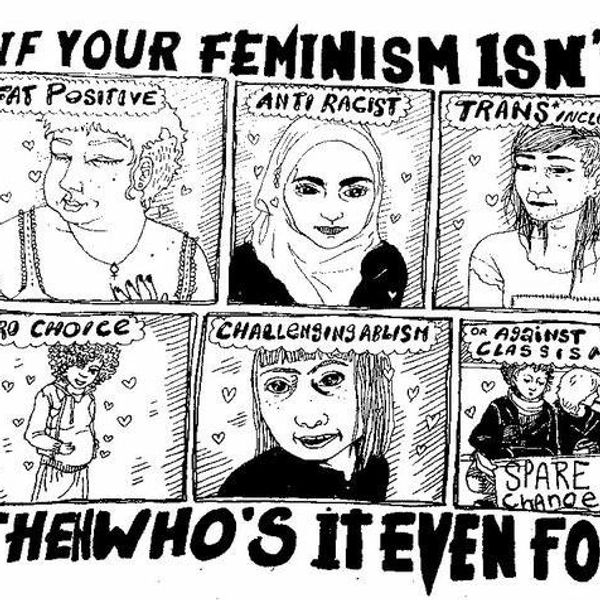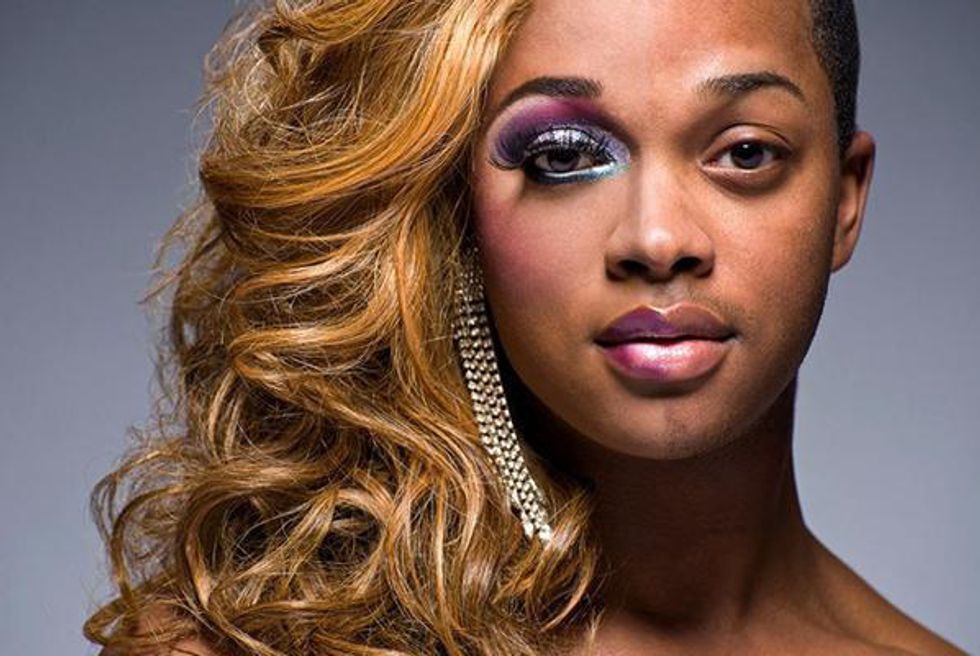Identity is a construct that is so often believed to be a rooted, one-sided reality. So often placed upon the pedestal of “traditional thinking;” following the narrow path of singular thinking. A narrow line drawing together two socially constructed hierarchies; a line that Judith Butler strives to disintegrate. Butler questions the very power structures that are. Striving to reveal answers about such formations of identity and subjectivity; tracing back how “gendered” identifications were promoted by the existing power structures (Salih, 2). Butler’s works, including that of Performative Acts and Gender-Constitution and Gender Trouble, strive to define a philosophical answer to the question of what exactly constitutes, let alone the reality, of gendered oppositions. Butler introduces a form of understanding beyond the linear, seeking the connection between societal expectation and therefore, in response, our representation of “gender.”
Butler comes to define gender along the lines of the society it inhabits. It has no original existence, but in turn a consequence of imitation (Salih, 127). Gender is in no means what we think it is. It is far from a traditional understanding of gender being rooted in sex, therefore acquiring itself through such socialization norms. Gender binary is created solely on the social level, shaped by its preconceived taboos and accustomed conceptions of what masculinity and femininity are. (Butler, PAGC, 270)
Butler frequently coins social constructivism and social control in explanation to said, “defined” gender roles. Constructivism represents a social reality produced by discourses, activities, and practices of individuals – in turn, generating its formation by power relations. Thoroughly playing hand in hand with the idea of the control, which presents the idea that preconceptions, behavior, desires, thoughts, and feelings of individuals are fully formed by society itself. Therefore, supporting Butler’s claim that gender roles are “punitively regulated cultural fictions.” Gender stands as a product of societal influences rather than individual choice. Society has given the narrow definition of gender by means of biological roots, in order to make a role feel “natural.” (Butler, PAGC, 273) However, the reality of being a man or a woman is rather a performative effect, only made to feel “natural” due to our repeating of this socially controlled performance in order to feel legitimized among our own society. (Butler, PAGC, 272) A forced normality that has been so often repeated since the dawn of evolution, we can no longer acknowledged that we are all merely acting within a set of guidelines.
Butler originates an explanation in turn, coining the societal act of “gender performativity.” Explaining gender as a product of a culmination of repeated actions, one forms their identity in turn through their performance. Gender is not what one is, but conversely, what one does. Repeating their performance over time, copying, by societal pressure, without a solidified original in order to form a sense of identity. Citing gender as a “corporeal style,” Butler expresses that the following of societal gender norms is in turn an action of survival. As those who do not perform said roles “correctly” are often chastised and punished by their respective societies (Butler, GT, 139-140). Through the act of performative gender, society frames its performance in such a way that not only are we insinuated to imitate, further more, we are convinced into its self-created “actuality.” Constantly creating as we continue to act out the binary creeds society has written out for us. (Butler, PAGC, 270-273) Creating ourselves outside of the definition of “individuality” and instead just working through the lens of imitation.
In revealing the mere shadowing act that encompasses our societal understanding of gender, Butler calls to the spotlight the ideal that in turn gender identity is neither fixed nor stable. Gender has no linkage in biology, but instead a social construct that may even vary over time in order to fit its generational normality. Gender therefore, instead of a constructed binary, is fluid. Gender is plastic, malleable. There is no fixed “essence.” What one believes about their “natural” gender is contrast is an illusion that has been produced by repeated actions and societal norms concerning gender specific behavior. (Butler, PAGC, 277) Reflecting Butler’s claim that binary distinction itself is socially constructed. Therefore, highlighting the fact that the binary system is indeed oppressive, forcing us into the designated identification of either a “man” or a “woman;” repressing our desires to fall outside of the construct. As well as the allowance of belief that one gender holds a significance over the other. Gender dichotomy has given leeway to the allowance of the ideals of gender superiority, most commonly present between men domineering over women. Gender could have been created in order to force such division to assert false dominance in order to gain control. Covering up the reality of its fluid nature, in order to enforce prejudice and misogyny. (Butler, PAGC, 280-282)
There is no core self of personal identity that we are tied to. In fact, Butler claims we don’t have one at all. We are in turn not “subjects” caught at the will of an essential nature. There is no tethering to one definition of self, it is not something we essentially have and merely express through our actions. There is no “soul” that we must reflect; the soul itself is a construct crafted by societal expectations. Rather we make ourselves from our repetition of actions over time; we are constantly changing. Allowing implication that one can have power capable of shaping change within them. (Butler, PAGC, 279)
We are able to self-fashion, transforming ourselves through the way we live, think, and act. According to Butler, in principal, if we are able to overcome these societal norms—we could be free to shape ourselves in whatever way we see fit. Since gender identity is produced by repeated actions, how we diverge and find new ways of “playing” the role can in turn, change our gender identity. As an effect of social construction there is in turn no “true or false” gender. They are all performances, so in kind there are no “unnatural” performances (Butler, PAGC, 279).
In engaging within our freedom of choice, one may stray from the conformity of the imposed binary. Allowing us not only to transform our own gender identity, but giving way to undermine the binary categories attached to “gender roles.” In turn allowing for a more diverse society to form, creating a more common acceptability of the freedom attached to our natural fluidity. Creating a more open environment for gender differences to be fully embodied.
Sprouting from Butler’s works, Subversive Gender Performances have come about in order to challenge said socially constructed gender norms. The most popular of such examples are represented within comedy, most notably drag interpretation. Using such performances to highlight the hierarchy that heterosexuality had built for itself among societal expectations. However, with gender being in and of itself is a parody, Butler makes sure to note that parody within itself is not what makes the work subversive. It is how the work strives to destabilize the “gender platform.” (Butler, GT, 139) When done correctly, gender subversion is meant to blur the socially constructed lines between “man” and “woman” as well as that of “heterosexual” and “homosexual,” not exemplify them. But as quoted, “to displace the very gender norms that enable the repetition itself,” (Butler, GT, 148), in order to dissolve the stigma of gender itself. Calling the performer to use subversion in order to displace constructs, as opposed to reinforcing them. Using their performance to highlight the misconnections of gender imitation and role separation, calling in theory to make all representations one conglomerate, fluid being.
Butler’s work has not only given represented allowance of fluidity, but has in turn inspired the modern definition of what is referred to as the “Gender Spectrum.” The Spectrum is loosely defined as a representation of perceiving gender as having multiple definitions and representations, ranging outside of the binary dichotomy of “man” and “woman” and stretching out into multiple forms of androgyny. The Spectrum gives a more nuanced understanding of gender, allowing all contributing factors outside of the common traditional tie of biology to give understanding to varying identities. The Spectrum itself has a direct line to Butler’s work, taking opposition out of the equation and presenting gender in the form of an extensive consideration of validity of every person’s experience of self. Fighting the very idea of gender as a socially forced upon construct, and welcoming and giving credence to all those who vary outside of the traditional dichotomy, whether it be of great or slight variance. (Understanding Gender)
Gender has too often been imposed as a one-sided, singular social construct; a narrow pedestal for “traditional thinking.” The philosophical work of Judith Butler not only goes as far as to try to give option to the disintegration of said social constructions. Butler gives definition to the oppressive hierarchy of gender roles and oppositions, defining gender along a broader sense of fluid being. Insinuating that if one can move past the forced societal norms and taboos of gender dichotomy, one can undermine and express themselves beyond it. Giving allowance to the blurring of past constructions and forming a whole new understanding of expanded self-fashioning. Inspiring the thought of future acceptability and allowance of gender differences to be fully embodied. All gender is a performance, one that can never be stigmatized as “unnatural.”
























